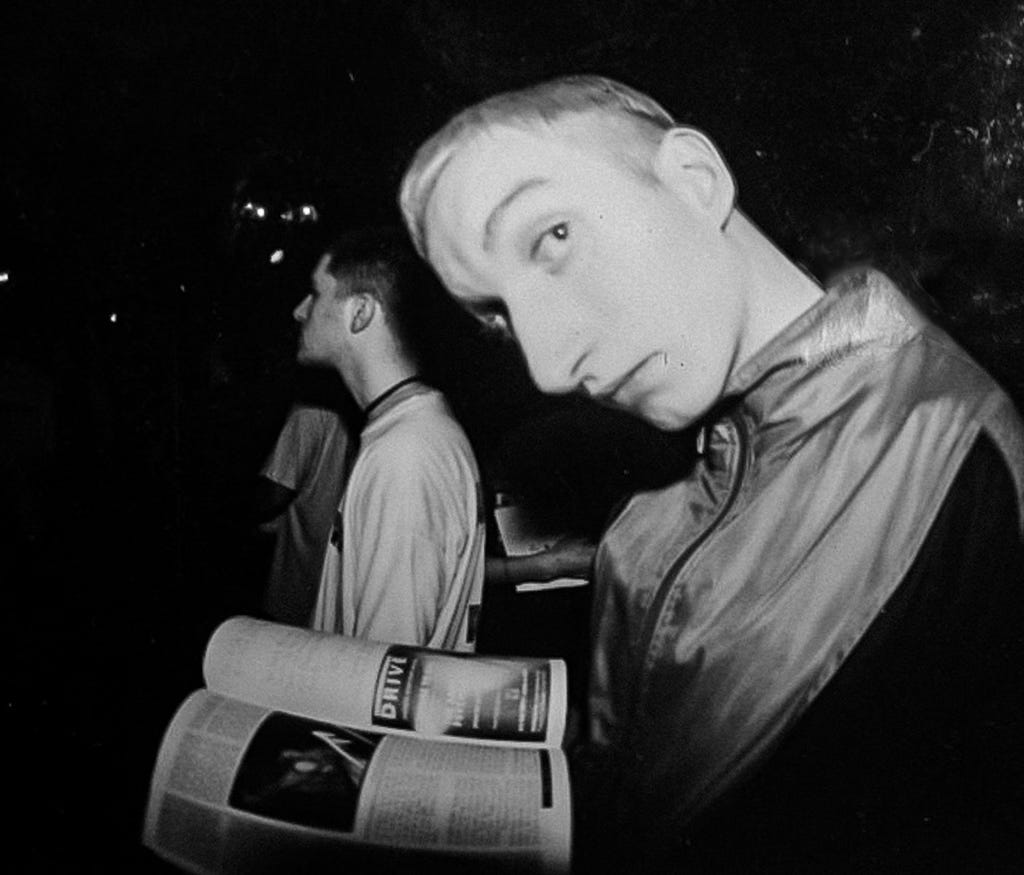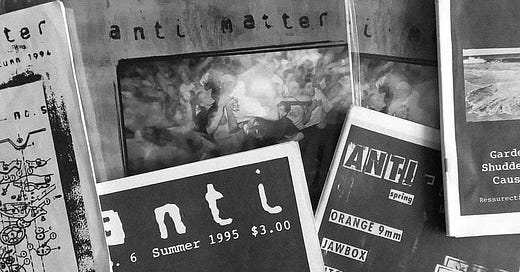Origins: In Praise of Fanzines
To begin this anniversary month at Anti-Matter: An homage to the fanzine as a site of transformation and a brand new merch drop to celebrate this milestone.

I.
What you are reading is a hardcore fanzine. It looks a little different—and feels a little different—than it used to. But the essence of what I’m doing with this so-called “newsletter” is indistinguishable from the essence of what I first attempted to do on paper in the nineties. I am creating a written record of my own experience in hardcore, and I am collecting other people’s stories as a way to expand the range of our community’s story beyond my own limited scope. I believe this kind of work has both individual and collective value, and that’s why I continue to do it.
The other day, while speaking on a podcast, I had an interesting realization: Almost all of our “hardcore origin stories” tend to prioritize either the discovery of a record or that a-ha moment of going to your first show. I’ve certainly shared those details in my own story before. But what’s interesting about my story is that the space between my first and second shows follows an indirect line. It took at least seven months to get from one to the other, in fact. But I used that interim, almost exclusively, to devour dozens of hardcore and punk fanzines—beginning with Maximum Rock’n’Roll and Flipside, of course, before eventually moving deeper into titles like Forced Exposure, The Big Takeover, and Suburban Voice. If I have to point to a single discovery that changed my trajectory with punk, it’s this one. Those zines not only educated me about the music I was beginning to love, but they gave me a glimpse into the culture and the history and the people who gave that music life. They gave me a rope to hold onto and a future worth imagining. By the time I went to my second show, those fanzines had already made me feel like I was more of a part of this community than anything in my record collection ever did.
Fanzines have always played an outsized role in the way we define and create our culture. This isn’t—and shouldn’t be—a new idea, but it’s a fact that does seem to have receded into our cultural memory. The best zines, as I see it, literally introduce us to each other.

II.
July marks the one-year anniversary of this iteration of Anti-Matter, and that’s worth celebrating. To do that, I’ve designed a three-part arc for this month’s “issue,” where each week will represent a different phase of my experience with doing this zine: Origins, Foundations, and Future. I’ve chosen my interview subjects carefully and with much forethought, and I believe that each of them brings a unique perspective to the community. Whether their experiences vary by era, geography, ideology, or even cultural and national identity, all three are distinct from each other and all three have valuable lessons to share with us.
I’ll begin by saying, then, that there was never any question over who I wanted to speak with for Origins Week. Kent McClard’s No Answers, which was published regularly between 1984 and 1990, was particularly instrumental in my decision to even start a fanzine, and even more than that, it encouraged me to think about the possibility of a hardcore zine where personal conversations are a form of community activism and personal experiences are valued shared resources. It was Kent’s staunch community ethos and fearless expressive writing that put me on this path. Few counterfactual statements are truly knowable, but I can say—definitively—that were it not for his work, I would not have found a torch to carry forward. I’ve said it before, but perhaps never as emphatically: The origins of Anti-Matter begin with No Answers.
More than any other zine editor in the eighties, Kent McClard always maintained a level of gravity to what he did. In his hands, “doing a zine” was less of a hobby and more of a responsibility to the conviction that “the hardcore fanzine,” as a form, has the potential to shape our community as much as it merely reflects it. Fanzines, he explains, are instruments of conservation.
“I think I wanted to change the world,” Kent sincerely says of his early objectives with No Answers, in an interview that will be published in full on Thursday. “I just wanted to do something that mattered. Because if you really get down to it, I took all of this stuff very seriously. I took Crass seriously. I understood that not everybody viewed it that way, but to me this was a revolutionary movement about creating space for people to be different and to not have to be so conformist… Hardcore saved my life. It gave me a place. There was a space there that improved my life and gave me something that is the most valuable thing that’s ever happened to me. And I really wanted to make sure that that experience would be available to people in the future. My mission since college has basically been to make sure that hardcore never becomes elitist, that it’s always a place where freaks and outsiders will have a place, if they want it, to try to thrive and find their place. And I think that’s the biggest message of No Answers. It was about trying to secure that space for people, and to encourage people to do their own thing and to find their voice and to have their own experience.”
In my own experience as both a reader and writer, I, too, take this stuff very seriously. I know that a great fanzine acts not only as a window into our world, but as a mirror that we can hold up to ourselves. I know that zines can become both sites of self-evaluation and spaces for transformation. And I believe that this medium of ours—in one form or another—should be preserved.

III.
Over the last year I’ve given a couple of well-timed nudges to encourage you to become a paid subscriber to Anti-Matter, but overall, I’ve clung to a mostly hands-off approach. As we approach this one-year anniversary, however, I think it’s important to take better stock of why your support is important and why now.
First, the why now: As we hit this milestone, many of the early supporters who paid for a yearly subscription will be thrust into the decision of whether to resubscribe or cancel. In the subscription world, this is called “churn”—the dreaded cycle of losing subscribers and hoping you did enough to attract enough new subscribers to soften the blow. Obviously, I hope most of you will choose to resubscribe and support the coming year of Anti-Matter, but I also understand that some of you might be in a different financial position than you were last year or just won’t be able to for whatever reason. I get it! For everyone else, the best that I can do at this moment is try to remind you why you subscribed in the first place, and hope that you’ll continue to support this project.
So why subscribe? Over the last year I have published a consistent stream of contemplation and hardcore conversation with thoughtful people from every stripe of our community fabric. I’ve made a concerted effort to represent as many voices as possible—from first-generation hardcore legends to new-school up-and-comers, from traditional hardcore to emo and post-punk, from the United States to around the world, across lines of race and class and gender and sexuality. I’ve written tens of thousands of words about what we talk about when we talk about hardcore. In its essence, I have stayed true to the original ethos that I conceived for Anti-Matter when it first launched 31 years ago: I believe that hardcore is more than music, and that we can only understand our community by understanding ourselves. Having a space to do that is crucial for the future of our scene.
While much of the conversational space in hardcore has been ceded to podcasts, I still believe that fanzines—places where artists don’t need to sound entertaining for two hours, where they can take their time to answer questions, where they feel free enough to speak without worrying about what it sounds like unedited—are absolutely necessary, and I think the work I’ve put into the world over the last year is unlike anything else that’s currently happening. If you agree, then pledging your support with a subscription (or continuing to pledge your support by resubscribing) is the best way for me to know that this work should continue. In some ways, the only real metric I have.
The reality is that I would like to continue doing Anti-Matter for a long time. But frankly, this is work, and sometimes it’s a lot of work. And because I value my time and effort and experience, I know that this work is worth something. A paid subscription gives me personal encouragement and financial permission to spend more time and effort on making more—and even better—things in the future. Surviving this churn will give me every indication I need on the future of Anti-Matter.
IV.
Finally, an announcement: Many of you have been asking about a new merch drop, and to celebrate this zine-birthday, I’ve asked Jesse Reed, who is also the designer behind Anti-Matter’s visual identity, to help me put together an anniversary collection that is also kind of summer-ish. I love it.
For this low-key merch drop, I’ll be leaving the pre-sale open for an extended period of time—eighteen days, between now and July 19—after which the shop will close and all merchandise will be made-to-order and delivered to your home. After July 19, these designs will no longer be available.
Additionally, as an extra thanks to my paid subscribers, I’ve made sure to include another exclusive t-shirt and crewneck design for the collection—just for you. After the fold, paid subscribers will find a password you can use to purchase the exclusive ANTI-MATTER COMMUNITY TRUST design, as well as a discount code that will also give you an extra 15% off the entire drop. Again, if you’ve been on the fence about subscribing, now is a good time!
Thank you for all your continued support, and happy birthday to Anti-Matter. I’m looking forward to bringing you a very special month. x
Norman
Coming on Thursday to Anti-Matter: A conversation with Kent McClard of No Answers, HeartattaCk, and Ebullition Records.





